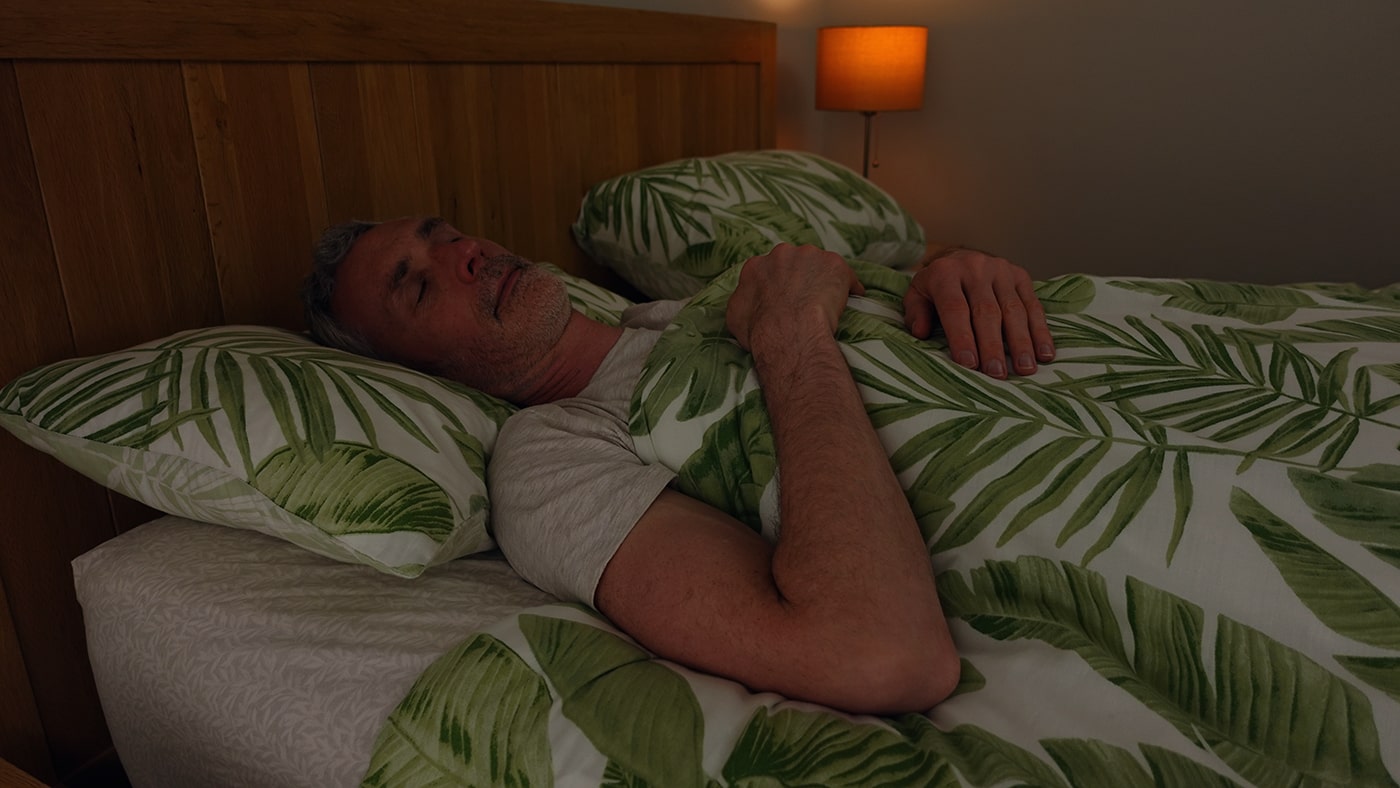
That’s me in the photo above, doing my best to pull a good sleep pose for the photo.
I have a high-quality mattress, comfortable bedding, a bed cooling and heating system, and a wide range of other sleep tech devices. And yet, I still sometimes have a bad night’s sleep.
So why is that?
While all of those items help in their own way, I still believe I have to take responsibility for my sleep. By that I mean doing more of the things that I know help me sleep better, and less of the things that I feel disrupt my sleep.
Solutions and habits
Even the best bed in the world won’t magically make me fall asleep if I’m wide awake. And as much as I love breathing exercises, if I’m wired from guzzling down too much strong coffee in the afternoon, there’s going to be a LOT of deep breathing before I fall asleep.
Don’t get me wrong – I think it’s good to have effective solutions to specific problems: earplugs for noise; a big bed for couples; the right style of mattress for you personally; appropriate bedding for hot or cold weather, etc.
But it’s only half of the picture – for me at least. I still need to be mindful of what I do during the day, and the night, if I want to get a good night’s sleep.
In this article, I’m going to share 10 sleep tips – some of the key actions that work well for my sleep. They might not all be right for you, but I think they are worth considering and there may be one or two that you haven’t tried before.
Keep in mind that I try to do all of these techniques as often as is reasonable. And that’s the secret for me: it’s not a case of having a go when you remember. It’s a case of working out which methods work well for you and then trying to stick to them as often as reasonably possible.
The short version
- Keep your bedroom cool, dark, and quiet. Temperature is personal, but don’t let it get too hot, cold, or humid.
- Tire out both your body and mind with activity.
- Spend time in daylight, ideally earlier in the day.
- Stick to a regular sleep schedule.
- Read or listen to a book until you feel sleepy.
- Don’t let yourself get stressed if you can’t sleep, or wake up in the night. don’t focus on not sleeping, but think about how comfortable the bed is and let your mind wander to something pleasant.
- Be mindful of what and when you eat and drink.
- Don’t take stress to bed. Make a to-do list, avoid heated conversations late at night.
- Make sure your bed is big enough, and consider a backup bed if you or a partner are disturbing each other’s sleep.
1. The bedroom cave: cool, dark and quiet
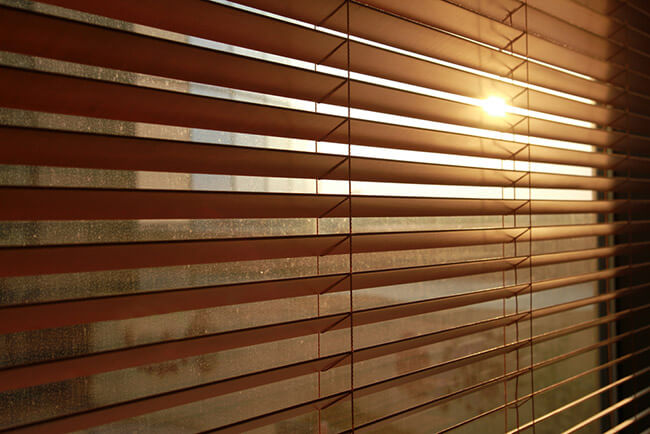
I sleep best when my bedroom turns into a cave when I turn the lights off. Not a ‘man cave’ with an Xbox. Just a cool, dark and quiet cave.
Temperature
When I was doing my own reading around the recommended bedroom temperature, I discovered there was conflicting research evidence as to what it may be. It’s complicated by the fact that different groups of people seem to prefer different ambient room temperatures.
For me, setting the bedroom thermostat to 19°C or less feels most comfortable, especially when I share the bed. You might prefer it a bit warmer or cooler than that – it’s something to work out for yourself. Just keep in mind the general rule of thumb that too hot, too cold, or too humid may be problematic.
I pay particular attention to how the bedroom and bedding are set up as the seasons change. And importantly, if I feel too hot or too cold when I get into bed, I do something about it rather than accepting it and just trying to fall asleep anyway.
I turn the heating off in the bedroom long before going to bed, and never use warm bedding in the summer (I’m mindful not to be too cold in the winter though).
I always have a quick shower before going to bed, even if I had one in the morning. It feels good to freshen up, and it also feels cooler when you get out of the shower and go to bed.
I’m also lucky enough to have a bed cooling device. But even with that, I make sure the ambient room temperature and bedding are appropriate for the current weather.
Noise
I turn off any devices that make noise unless they are essential. For all other noise, I tend to use well-fitting earplugs with a high noise reduction rating of 33 decibels or sleep headphones.
Light
I always make sure the sunlight is blocked out, especially in the summer when it rises early. I have a sleep mask to hand if the light finds its way in, and always take one with me when I’m staying away from home.
Cool. Quiet. Dark. Three important words for me when it comes to bedtime.
2. Tired body + tired mind = better sleep

My insomnia was at its worst in my early
In my later 20s, I started a much more mentally challenging job and got into weight training and swimming. I soon found that I would sleep better on the days when both my brain and body were tired.
So, I try to tire out my brain and body every day. Even if I’m having a rest day following more strenuous exercise, I’ll at least go for a long walk and spend plenty of time outside.
If you’re not currently in work, or don’t have a job that’s mentally taxing for you personally, then there are other ways to challenge your brain. Reading a book, doing puzzles, upgrading your skills, learning a language, working out how to fix or improve something, job hunting, finding a side hustle or business opportunity – the possibilities are endless.
However, I also think it’s okay if you just can’t find the energy or motivation to exercise some days. But I try to keep in mind a simple concept that’s deceptively easy to forget: If I’m not physically and mentally tired, I can’t expect easy sleep for free. And this is something I can control.
3. Spend time in daylight

In the photo above, I’m walking in one of my favourite woods. My daily morning walk in our local park isn’t quite as stunning, so I try to get out into the woods most weekends. It’s my happy place!
Back in 2023, I had an ongoing issue with back pain. Both the physiotherapist and chiropractor I saw, as well as numerous podcasts, videos, and articles, suggested going for a walk first thing in the morning rather than doing my usual yoga routine.
Over time, my back pain got better, but I also noticed that I started falling asleep quicker too.
I’ve always spent time outdoors when possible, but this was the first time in my adult life when I developed the habit of going for a 30 minute walk every single morning. And I still do it to this day.
The effect of daylight isn’t unique to me. Exposure to daylight is one of the key factors that influence the human circadian rhythm. And research studies, such as in 2019 and in 2022, have found that people who spend adequate time in daylight have improved sleep.
One of my favourite podcasts is ‘Feel Better, Live More with Dr Rangan Chatterjee’. Three episodes I listened to in which he asked sleep experts, such as Dr. Matthew Walker, for some actionable tips all had spending time in daylight in their top tips.
4. Less lazy Sundays
The sleep habit I probably hear or read about most often is to stick to a regular sleep pattern. For many years, I used to get up at a regular time during the week to go to work. However, I had no set bedtime – it could be anything between 10 p.m. and 2 a.m.
At the weekend, like many young people, I’d often stay out late on Friday, Saturday, or both. And then have a long lie-in on Saturday, Sunday, or both.
It wasn’t unusual for me to wake up on a Sunday with a hangover, watch movies and eat pizza (like a normal person). However, I wouldn’t be tired enough to sleep well on Sunday night, which in turn would knock my whole week out of sync.
The answer?
For one thing, I don’t drink any more so my sleep isn’t affected by parties or hangovers. And unless I’m feeling particularly sleep deprived and need to recharge my batteries, I go to bed and get up at more or less the same time every day of the week.
If I do stay up later at the weekend one night, I still set my alarm for a reasonable time the next day, making do with a bit less sleep but keeping my schedule on track.
“Boooooring!”, I hear you say.
And I get it. If your social life is more important than your sleep right now, that’s obviously your choice. But if you’ve just slipped into the habit of staying up late for no particular reason and then sleeping in late too, this might be an adjustment that reaps rewards.
5. Read yourself to sleep
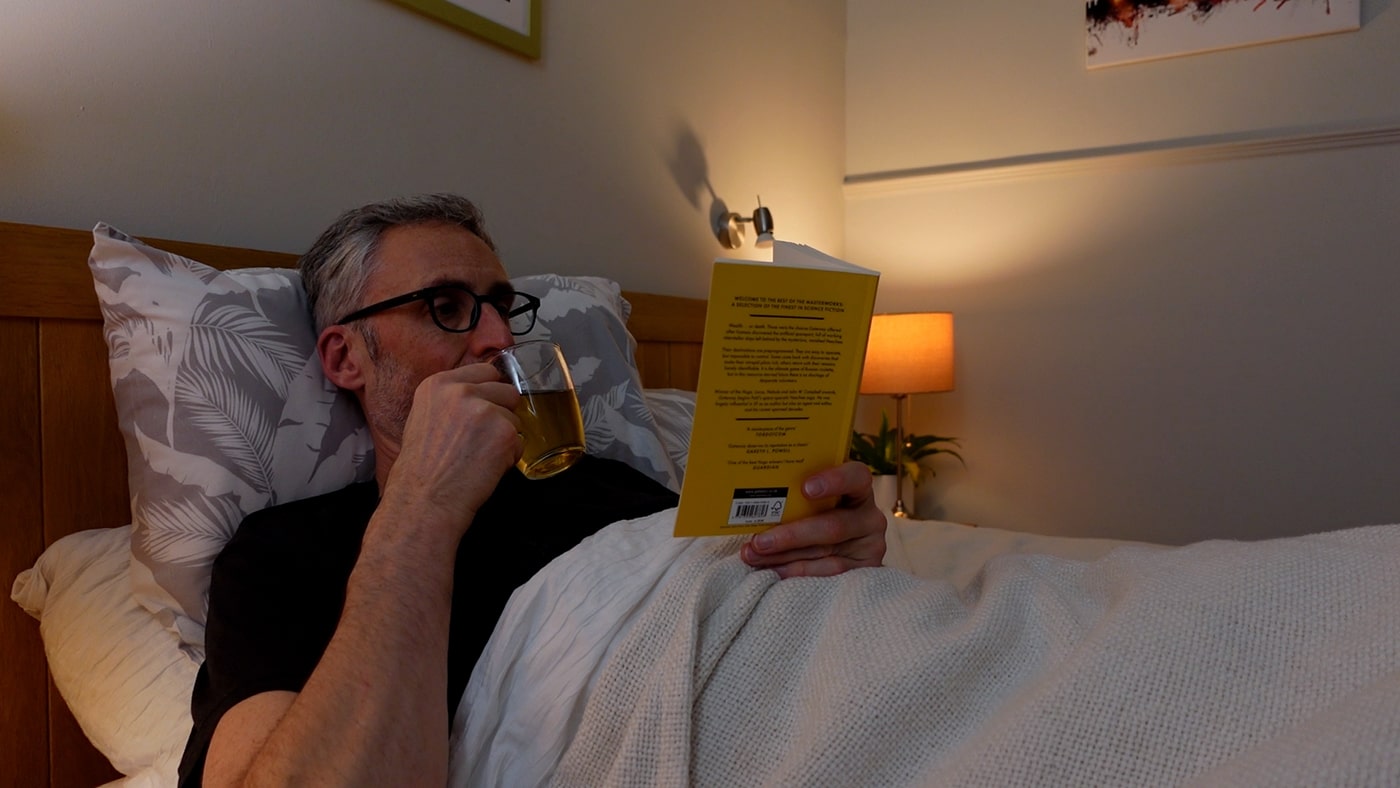
It’s so simple, yet it’s one of my favorite techniques. As often as possible, I read in bed until I can no longer focus on the words, or wake myself up with the book dropping out of my hand.
It’s important to note that while in an ideal world you’d go to bed at the same time every night and fall asleep instantly, it doesn’t usually work that way.
Instead, it may be better to do one of two things:
- Only go to bed when you feel tired.
- Go to bed at a regular time and read until you feel tired enough to sleep.
The first method can work well if you can’t face lying in bed tossing and turning for hours. However, I usually prefer the second method. At least you’re in bed relaxing and letting your body and mind know that it’s bedtime.
If you’re not a fan of reading books, you could listen to an audio book, podcast, radio, or try doing a relaxation exercise in bed until you feel sleepy.
6. Keep calm and carry on
For many years, I was my own worst enemy when it came to dealing with insomnia and I didn’t even know it.
I used to think I should be able to fall asleep immediately (20 to 30 minutes is actually quite normal). When sleep didn’t happen within a few minutes, I’d start stressing about being awake.
Even if I did fall asleep, I’d often wake up in the night or long before my alarm was due to go off. This would then trigger anxiety that the next day would be awful because of a lack of sleep.
My self-defeating stress was pointed out to me one night by my partner. She was fed up with being woken by my constant position changing and grumpy huffing and puffing (which was louder than I thought, apparently).
I eventually decided to try what she suggested: just stay calm. By making the decision to change my attitude, I believe there was a positive shift in my mind. After that, I started falling asleep a little quicker, no matter what time of the night it was.
By accepting the fact that sometimes I won’t sleep right through the night, and by understanding that the next day won’t be as painful as I feared, it’s much easier to keep the late night anxiety at bay.
So instead of focussing on my sleep, worries, or the next day, I focus on how comfortable the bed is and how nice it feels, try to relax and think about something pleasant.
7. Be mindful of what you eat and drink

I’m not sure if there is a perfect diet for sleep, despite ongoing research into what does or doesn’t affect our sleep.
Nevertheless, there are a few key factors that seem to help me:
- I gave up caffeine.
- I gave up alcohol.
- I try to eat a big lunch and a lighter dinner.
- I don’t eat sweet or spicy food late at night.
- I keep hydrated and drink plenty of water during the day.
- I eat a healthy diet, with lots of vegetables and fruit.
I’m not saying you should also give up caffeine and alcohol, but if you’ve been thinking about it, you might find those articles above interesting. Otherwise, my advice would be to drink less of it in the evening/night and try not to drink caffeine after lunchtime if possible.
8. Don’t take stress to bed
Stress, anxiety, worry, thinking. Whatever you want to call it, switching your mind off at night isn’t always easy. I think it’s good to find a (healthy) way to do so though.
For me, it’s really important that I don’t allow my bedtime to be my thinking time, especially during times when I have bigger challenges or problems.
Here are some ways I try to halt the nighttime train of thought:
- I try to allow time earlier in the day to sit quietly for a moment and think about important matters. It’s also another really good reason to go for a walk if I have a lot on my mind. That way, I don’t feel like I have to solve all my problems in the dark with my eyes closed.
- If I have lots on my mind, before getting into bed I write a quick list of things I need to do, plan or even think about. Then I can relax knowing that I can pick it all up again in the morning with a fresh outlook.
- When my mind is overactive, I do simple breathing exercises in bed to distract myself.
- I agree with my partner not to have emotionally charged or difficult conversations at night in bed. They are always best dealt with during the daytime when you’re not tired and in a good mood.
- I try to talk about my worries during the daytime with someone I can trust, and don’t keep them all to myself.
9. Allow enough time for sleep
Sleep is crucial to our physical and mental well-being, yet we so often sacrifice it for other activities.
I used to push my bedtime right up until the start time of what would be my ideal amount of sleep. So if I felt I needed eight hours to be at my best and had to get up at 8 a.m. for work, I’d go to bed at 12 a.m.
The problem, however, is that this can then trigger that feeling of stress if you get into bed and don’t fall asleep straight away. You’re kind of setting yourself up to fail.
Nowadays, if I want eight hours of sleep, I go to bed at least eight and a half hours before my wake up time. If I’m watching a film, I pause it. If I’ve got work to do, I leave it until the morning.
Don’t allow unnecessary things to erode your precious sleep time. Give yourself a chance to go to bed feeling relaxed about how much time there is before the alarm goes off.
10. Big enough bed and backup bedroom
A few years ago, my partner and I experimented with sleeping in different bedrooms.
It made a significant difference to our quality of sleep. We both had loads of space in bed, we didn’t disturb each other when we had a bad night’s sleep, and we could have the room temperature and covers exactly how we wanted.
After a year, we decided that it was a bit sad to sleep apart, so we decided to buy a king-sized bed and squeeze it into the bedroom. It made a massive difference.
More recently, my partner has needed to get up very early from time to time. We often sleep separately the night before so she can go to bed earlier without me disturbing her when I go to bed, and she doesn’t disturb me in the morning either.
So my theory now is that if you have any suspicion that you and your partner are disturbing each other’s sleep, try getting a bigger bed. If that doesn’t work, have a backup spare bed you can slink off to if their snoring or movement is disturbing your sleep.
Failing all that, just have separate beds. You won’t be the only couple saving your sleep that way.
Final word
It’s important to get a professional opinion if you have ongoing problems with your sleep. If, for example, you snore or have any kind of breathing irregularities in your sleep, it’s a good idea to talk to your doctor about it.
If your sleep problems are impacting your, or your family’s, well-being, it’s worth seeking a medical opinion and advice. There could be an underlying health condition that needs treating or a sleep disorder that can be managed.
Your views
Do you have any experience of the tips in this article? Do you have any techniques of your own that you’d like to share?
Feel free to share your story and thoughts in the comments below.


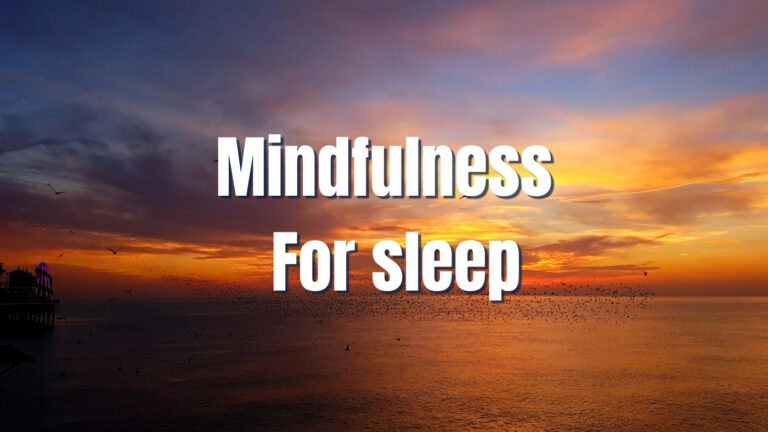
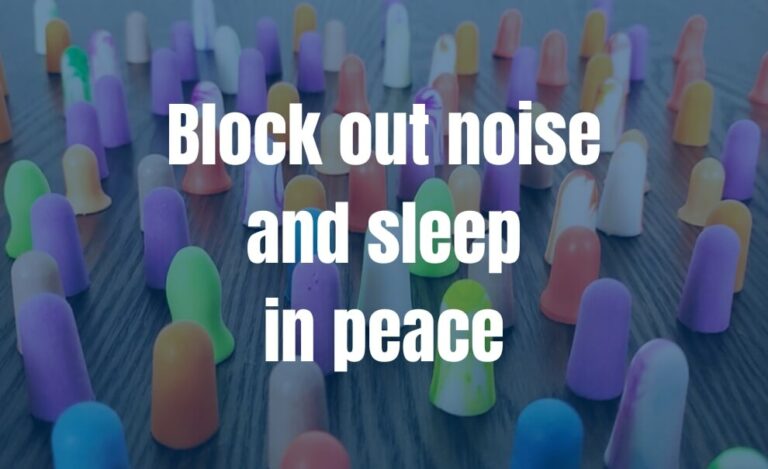

Hello Ethan, interesting blog you have there. After cutting all processed foods, I still saw no effect on sleep. I even kicked my habit of vaping which had zero effect. Now I’m trying to quit caffeine to see if something would improve. Still day 3, but I’m experiencing insomnia, hence I’m leaving a comment at 2 am waiting to go back to sleep after only 3 hours of sleep.
Hi Saafin
Thanks for your comment, compliment, and for sharing your experience. I think there is sometimes a window of time in which the body and brain is a bit ‘messed up’ when making big lifestyle changes. I’d give it a few more days and see if you notice an improvement in your sleep. Let me know, as I’m always fascinated to hear from people who try these kind of changes.
Regards
Ethan
Great article!
I usually jog around the neighborhood for a few minutes and then take a nice warm bath. I also do the 4-7-8 breathing technique for relaxation and it works!
Stay safe and healthy!
Cheers!
Thanks Rose, glad you liked the article. It’s good to hear from someone else who has tried that breathing technique.
Stay safe too
Ethan
Last year I had a blood draw done to check my levels, my iron, calcium, and magnesium were a little low, so I added those suppliments and my sleep was greatly improved, also helps with restless leg. Added a little yoga. On full moon nights what has helped was to just get up and eat a small bowl of cereal with a banana, this gave me a little tryptophan in the milk and potassium in the banana. A little more yoga or stretching and the crazy thing that works for me is a gel ice pack wrapped in a thin towel placed at the back of my neck and bingo I fall asleep for 3-4 hours.
Hi Shirley
Thanks for your comment and for sharing your ideas. I also find yoga makes a difference to my sleep. I like to do a little yoga at night, and then follow it with just 5 mins meditation. Seems to help a lot!
Regards
Ethan
I have a good idea about insomnia. You are very cautious about the causes and symptoms and tips of insomnia. Thank you very much sir
Hi Atikur
You’re welcome – glad you liked the article!
Ethan
I really enjoyed this article. I’ve been an insomniac since I was a child. My brain never has a quiet time. I do have a high IQ. Which could possibly be part of the problem. I’m going to follow your advice. I have been taking temazepam for a few years, but just recently it doesn’t seem to be working even if I take 2, plus I am recently on a low dose of an anti-anxiety tablet which has helped somewhat calm me down. Melatonin hasn’t worked for me and everything else I’ve tried results in a groggy hangover the next day. I definitely find that being calm when I wake up in the night and thinking nice thoughts and just being happy to be in a comfortable bed with a roof over my head when so many people don’t have that, helps me just lie there until I doze off even if it’s a few hours later, and if I’m tired at work I keep going to the bathroom and running my wrists under cold water to freshen me up. I’m going to try an antihistamine at the weekend so if I’m groggy the next day it doesn’t matter just to see if that helps. Thanks again
Hi
Thanks for your comment, and I’m glad you liked the article. I hope the ideas prove helpful to you – if you have time in the future, I’d love to hear back from you to know how you got on.
Regards
Ethan
Thanks for sharing your knowledge with us. This article was really helpful. There are many reasons why people have a difficult time staying asleep. The good news is that common problems with sleep are often easily addressed without the use of medication or pharmaceutical sleep aids. There are no guaranteed natural cures for insomnia, but there are effective steps you can take, including natural sleep aids
Hi John
You’re welcome, good to know the article was useful. You’re right in that there are often practical steps which will solve sleep problems. If only it were easy for everyone to find the right steps and then do them!
Regards
Ethan
Hi Ethan
I have suffered with sleep problems fo 20 years, it started when I was 50 in menopause and at the same time the break up of my marriage. Since then I have taken Zolpedine prescription sleeping pills which I am now addicted to and cannot seem to live without, but don’t always work, I often wake up after 4 hours sleep. The doctor is always telling me I should stop taking them but offers no alternative remedy and feel my life is dominated by these pills. I have tried practically every remedy on the market but nothing works as well as Zolpedine, but only take half of a 5ml tablet per night. It has got slightly better since retiring 18 months ago, now if I wake up at 4 or 5 in the morning I take a couple of paracetamol read for an hour and go back to sleep for an hour or so, but obviously not ideal. I read an article saying that sleep problems are inherited which was interesting as my Mum also suffered sleep problems and took sleeping pills for years, do you think this is true?
Hi Jean
Thanks for your comment. I can understand your frustration about your sleep problems. There is evidence that some sleep conditions can have a genetic factor, but it’s not always clear cut, nor the only potential cause of your sleep problems.
I think a problem is that no natural remedies will ever feel as reliable as a strong prescription sleeping pill. But that doesn’t mean it’s not a good idea to try to get used to milder sleep aids, if any at all.
Obviously, your situation is for you and your doctor to decide. But the fact that you’re reading an article like this tells me you’re looking hard for alternatives. I’d say stick with that quest! Make it a personal challenge to try to get on top of your sleep naturally if you can.
One final recommendation is to talk to your doctor about using paracetemol as a sleep aid.
Regards
Ethan
My insomnia started a lil over a month ago. In the past I have suffered from a couple of panic attacks that caused some type of chemical imbalance in my brain according to a psychiatrist. I took medication for this for a couple years and then quit without a problem. Well maybe almost 2 months ago I went to bed and and felt my heart racing a lil not knowing at that time that it was due to something I ate that caused me bad to my stomach. I started getting worried and had a panic attack which kept me up all night. From then on my sleep got worse with time. I was sleeping well two day one day not and so on until now it has become a problem. I can usually fall asleep but get up to the bathroom like I wallaby’s have and then can’t go back to sleep no more. Sometimes there are days when I can’t sleep at all. There are times when I do fall back asleep after going to the restroom but it’s so light sleep I wake up to the slightest noise. I have tried clonazepam which helps put me to sleep but it is not a refreshing sleep. Another weird thing is that even when taking clonazepam right at about 6am my body feels anxious like if I have slept enough all though I have not which is not a nice feeling. When I wake up and can’t go back to sleep I feel as if a lim anxious with my heart beating a lil oddly. I feel that due to this problem I might be starting some form of depression. I don’t enjoy or feel like doing the things I used to do before like working out and just living a normal life. I don’t feel like myself and even if I do get a few hours of sleep I know they ain’t deep sleep. I usually stay in bed till like 9 even though I can’t sleep and just worry and stress. About 2 years ago I struggled with sleep as well but that was due to medication I was taking for a virus I picked up. My sleep returned to normal on its own but this time it’s different and don’t know what it is. Could my own worry about not sleeping have caused and keep causing all this?
Hi Salvador
Thanks for your comment. I think it’s hard to know for sure what causes sleep problems sometimes. Maybe the panic attacks led to you worrying about not sleeping, as it’s easy to get into a vicious circle of worrying about sleep. I would recommend asking your doctor for help with the panic attacks and anxiety in general. Perhaps they can recommend you to see a therapist who can help you develop better coping mechanisms.
Regards
Ethan
Hi Ethan,
I started having insomnia symptoms back in February over stress, which usually doesn’t affect my sleep but couple that with the inability to fall asleep when I needed to because of noise (I live in the dorms so it’s loud randomly). It resolved itself eventually because it only happened for 4 nights and then spring break happened so I reverted back to my old habits, even if they were terrible sleep hygiene rules, and sleep came easily. Then I came back to school and it started again. I know the reason why which was daylight savings time happened, I wanted to shift my awake time and sleep time earlier by an hour and a half, and again my hall was loud. All of those things contributed to me not being able to fall asleep one night where I was tossing and turning all night. Then I thought I would sleep early again to make up for sleep, and I got myself into a vicious cycle of insomnia even when I gave up on the shifting my sleep time and the noise was no longer a concern.
Fast forward present day, I’ve tried prescription drugs, relaxation methods, and was so frustrated I couldn’t sleep. I’m now on sleep restriction, which I saw you wrote about in one of your previous articles. So far, it’s okay as I’m getting much better sleep than I was in March into mid April although the setbacks do make want to give up, but I’m trying to stay determined. I’ve figured the best thing is to stick to a regular sleep and awake schedule. Additionally, I think I finally came to terms yesterday that I can’t call myself an insomniac as that bothers me a lot. I started telling myself that I’m just going through a phase where I’m still in college where I developed a lot of bad sleep hygiene. I think getting a TV this semester for my room was a huge mistake as I’ve never had bad sleeping issues until I started watching TV while in bed. Also, I’ve never tried to adjust my sleeping time that dramatically over one night either. Hopefully, these are all true and will let me break my insomnia symptoms as soon as I can retrain my brain to sleep normally again, and I can return to some of my habits such as reading for hours in bed.
My questions for you are: did you ever try sleep restriction and how did it work for you? A part of my sleep restriction is I can’t nap, but do you think I’ll be able to nap again one day as long as it’s before 3pm and be able to sleep that night? I used to be able to nap for 3+ hours straight and wake up at 5-6pm and fall asleep again that night fine. This was just 3 months ago so I’m hopeful my bad sleep habits haven’t affected my brain that much yet and I’d be able to again in the future. Do you get sleepy at the same time everyday now that you have a consistent sleep schedule? I used to go to sleep anytime from 11pm – 3am even when I didn’t feel sleepy and slept just fine, so you can imagine I’m upset I can’t do that anymore. Also, when you do have bad nights again, how easy is it for you to get back on track? I remember I used to lay in bed worry about finances for school and wouldn’t be able to sleep but my sleep was fine until another stressor came. Now, I’m worried that since I got myself into a cycle that once I do have a sleepless night due to some random stressor, I would get back into a cycle.
Thank you for writing all of these articles! I’ve read so many of them, but it’s especially helpful to read it from someone who’s experienced it.
Hi Brianna
Thanks for your comment and questions. It’s nice to hear you’ve read more than one article and enjoyed them!
Sorry to hear you’ve had such trouble sleeping and that it’s become a source of stress for you. Worrying about sleep can annoyingly become a serious contributor to bad sleep itself.
It sounds like you’ve done a good amount of research and are on the right track. I think stopping watching TV in bed and reading again would be a positive step.
To answer your questions:
1. Yes, I have tried sleep restriction. It’s painful at times, but it did help me.
2. Napping might be possible again, but I think 3+ hours is way too much. Maybe a little siesta if you really need it, but not so many hours would be my opinion. But I’d stick with the current plan before introducing another sleep variable again.
3. I definitely don’t feel sleepy at the same time every day. It depends on a lot of other factors, like exercise, work and if it’s monday or friday! But I still try to stick to my window of timings.
4. When I have bad nights, again it varies as to how quickly I get back on track. Sometimes the next night is fine, sometimes there’s a small run of bad sleep. The main thing is to stay positive and remember that it will get back on track eventually.
All the best
Ethan
Hi Ethan I desperately need your help if your reading this then please answer my question.For the 9 days I am not getting regular sleep 4 of those I did not sleep at all and 3 of the days I slept very well.what is the problem how can I fix this?please help.
Hi Kaushik
Thanks for your comment, and sorry it’t taken so long to reply! Has your sleep improved now? If not, and it continues to bew that bad, I’d speak to your doctor about it. Going 4 nights without sleep at all over a 9 day period is something which needs to be looked at.
Regards
Ethan
I’m from Brazil, 39 years old and i always had relatively good sleep. However a couple of months ago i discovered i had an eye condition called central serous retinopathy, it’s a rare disease which basically causes distorted and poor vision in one eye, has no treatment and usually gets better by itself in about 6 months. So the doctor just suggested me to ‘wait’ but is very difficult because i’m literally seeing the problem all the time. Since then i’m having bad sleep almost every night because anxiety due to my eye’s problem. I go to bed and start to think about this, that it’s not getting better yet, why i had this and so on, and i’m caught in a vicious circle of tons of thinking that always result in nothing, just more anxiety and i just can’t sleep. I reached the point that i had almost no sleep in 3 consecutive nights. So recently i looked for help and went to a doctor that prescribed me Xanax and the medication is helping for a while. I started taking one pill, reduced to half and now i’m taking one quarter every night. I know the problems and risks to take this every night and i’m really trying not to take it (that’s why i reached out this site), but usually if i don’t take one quarter of it, i can’t sleep. I’ve been taking the pills for more than one month now, but because i don’t take an entire one, my box with 30 pills are lasting longer than 1 month. I’ve read a lot of hints in your site and will follow some of them and hope it will work for me, specially the one that says to go to bed only when you are really tired / asleep. This is one thing i’m doing wrong, because i go to bed always at the same hour, tired or not, and i will struggle to fall sleep no matter if i’m asleep or not. Thanks for your articles, i wish all the best !
Hi Paul
Thanks for your comment and for sharing your story, and I’m glad you found the site helpful. Sorry you’ve been struggling with your sleep with the anxiety due to your condition. I can totally understand – I also find that when I have serious worries on my mind, I struggle to sleep.
There are good techniques for dealing with recurring thoughts at night. I highly recommend mindfulness. I wrote an article a while back describing some specific mindfulness exercises for sleep that you might find interesting and helpful.
I agree that it might help you to go to bed when you’re tired – but do try to keep a stable waking time. But if you do find yourself in bed stressing, just spending some time doing those techniques can really help take your mind off your anxiety.
Regards
Ethan
Hi Ethan,
Just started having bouts of Sleep Maintenance Insomnia a year or so ago. Definitely related to many issues in my personal life, not entirely in my control. Also, I am a super-light sleeper. I couldn’t really read or get out of bed either because my guy needs his sleep, too! Somehow, I found a podcast through Google Play (it’s free) called, “Sleep with Me”. I download two episodes at a time and it has been a miracle. I just hit play in the middle of the night and it pipes through a pillow speaker. He basically tells boring, silly stories and you just drift off to the sound of his voice. He lists the things he is going to talk about in his synopsis and in the morning I look at it and just laugh–“Well, I sure don’t remember that!” It has been a game changer. Check it out!
Cheers,
Janis
Hi Janis
Thanks for your comment. I’ve tried a few different sleep apps before, with varying degrees of success. I’ll have a look at the one you mention.
Regards
Ethan
I have had bouts of insomnia throughout my 62 years, even as young as 12. I also have various kinds, the normal is when you wake up and cannot go back to sleep be because you don’t feel tired, that one no longer bothers me since I am retired; if I get 4 or 5 hours sleep I no longer care, just have an easy day after it.
However the one that does bother me, and I have always had bouts of this since I was young, is when I waken up but I still feel tired and when I begin to fall of back to sleep I awaken again immediately. This continues for maybe an hour or so before I eventually fall back to sleep or sometimes not at all; worse is when it’s accompanied with body irritation, an itch on my nose moves quickly to one on my back from there to anywhere else, then after 20 minutes I think I need a pee, but I don’t really but cannot ignore so I go. Get back into bed and thinking that’s it this time I am going back to sleep, only for it to start all over again; in the space of two hours I scratched myself about a hundred times been to the loo around eight to ten times, moved from my left to right-side umpteen times. Eventually I fall back to sleep unfortunately I sometimes wake up one or two hours later and go through the whole procedure again; that’s really challenging when that happens, sometimes it last for a few days but sometimes its weeks and then it disappears as quickly as it comes.
Over the decades I have tried various things, going to bed early 9.00 and getting up at 7.00, accepting broken sleep but accumulating sufficient hours so that I don’t feel tired when I get up, or going to bed late and getting up still early at seven, thereby forcing a tiredness on myself so that I have longer sleep episodes but less hours.
Truth is you have to just wait it out and try not to worry about it, easier said than done though. One thing that does help is having an iPad and playing an audio book at a low volume but the screen switched of; basically a lot of the time you cannot go back to sleep because you end up thinking about it or you are worrying about something. Listening to a story stops you thinking and you fall off to sleep easily, it has to be low though or you waken back up, unfortunately it doesn’t really work on the insomnia when you fall to sleep easily but immediately waken again. The only good it does for that type of insomnia is that it stops you from panicking; basically you just keep trying to listen to the story and in my experience although it takes a while you will eventually fall back to sleep even if it is three hours.
If you get a couple of hours early on and you manage to salvage another two or three before you get up, well Churchill and Thatcher survived on four each night for their entire lifetimes, but oh how I am envious of those who can sleep right through even on top of broken glass, it still wouldn’t bother them.
Hi Steve
Thanks for your comment and for sharing your story. There are a few things that sprung to mind when reading it, so I’m going to list my thoughts in response:
1. Have you ever looked into restless legs syndrome?
2. Do you have any allergies that you know of? I say this because I’m allergic to house dust mite. For many years I struggled with itching in bed, which sometimes wouldn’t come on until a while after I’d gone to bed. Once I realised this, I made sure I washed my bedding on a very regular basis, never used a fabric headboard, used hypo-allergenic pillow cases when possible and generally kept my house and bedroom squeaky-clean. No more itching in bed!
3. I’ve also suffered a lot in the past with waking up in the night for an hour or two. I think your attitude towards it is absolutely right – the important thing is to not panic, accept it and try to do something relaxing until is passes. Some call this sleep maintenance insomnia, others argue that it’s actually perfectly normal and sleeping in two phases is very natural.
4. I think that you might have been getting close to the best course of action with your experiments about bed time. My advice would be to work out how much sleep you really want and need, then be very strict about your wake up timings, as I suggested in the article.. You might find that by restricting your quantity of sleep you can reduce the broken sleep. And as you say, it’s often better to get a good solid few hours sleep than a bit longer but broken up through the night.
All the best
Ethan
Thanks a lot Ethan. Number two has to be the best. Often my body’s super tired but my brain just won’t shut down. I really appreciate you sharing this. Cheers
Hi Joanne
Thanks for your comment, and I’m very happy to hear you found the article useful. I agree that number one is the most important in many ways. I guess for you, the trick now will be to find ways to calm your brain down. And for that I suggest either taxing it as much as possible during the day and/or doing some relaxation techniques before going to bed, or even once in bed.
Regards
Ethan
I have tried sleeping tablets and herbal remedies for the last 3 and a half years and my insomnia has never changed… i have an irregular work pattern and can’t keep a steady sleep pattern, also my work hours can finish around 3 am which is difficult is i am off the next day without sleeping in or being exhausted to do anything with family or friends! What can I do to change this?? I am running out of ideas and doctors refuse to help as I am only 21 years old. Please give me advice to progress and make life manageable!
Hi Kim
Thanks for your comment. Sorry to hear you’re struggling to get the sleep you need. I can completely understand your frustration because of this. Unfortunately, shift work is known to be really difficult for many people to cope with due to the disruption it can cause to sleep patterns. Medical staff, police men and women, airlines pilots and stewards, for example, all know this too well.
Obviously some of my tips aren’t going to be practical for you. It’s not going to be possible to go to bed at a stable time if sometimes you don’t get home until well after 3am.
Short of accepting that shift work isn’t for you and changing your job if possible, it’s often a case of trying to cope as best you can. I’d suggest on the days you do get home late, try not to sleep in too late. If you can bear it, sleep for less hours, but get up at a time closer to a normal rising time so that you reset your sleep pattern.
It’s also helpful to ask family and friends to understand and respect your unusual sleep patterns and to try to let you get at least a few hours of undisturbed sleep. And if you can, have them stay quiet while you sleep, even if it’s daytime for them. Unplug your phone and put a note on your door asking people not to disturb you.
Additionally, try to make sure your bedroom is blacked out and quiet. Perhaps use earplugs or a white noise machine to block out external sound, which is always louder in the daytime than the night.
All the best
Ethan